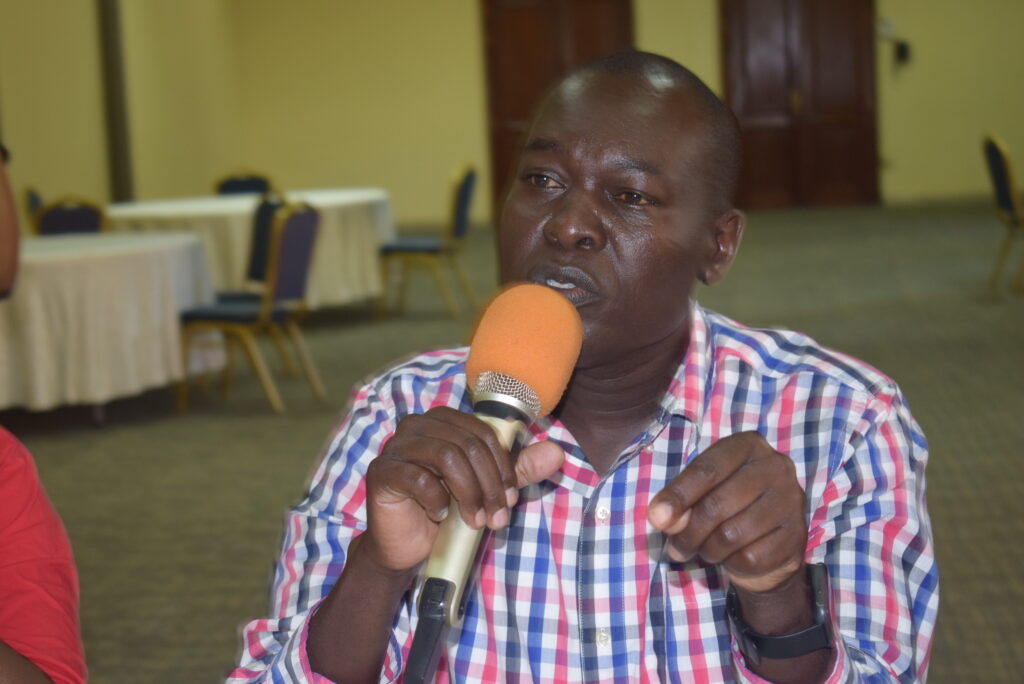Journalists in Kenya have developed a curriculum to train reporters on how to cover Climate Change issues.
The Kenya Editors Guild (KEG), an association which brings together editors from various media organizations, spearheaded the process which resulted in the production of the curriculum dubbed ‘Equipping Editors and Reporters on Climate Change Reporting.’
The initiative was supported by the German Agency for International Cooperation (GIZ) and Ministry of Environment, Climate Change and Forestry.
The curriculum covers; understanding climate change, examining legal and policy responses to climate change, advancing gender and social inclusion in Climate Change reporting, sourcing Climate Change stories, among topics.
This document equips journalists with required skills and knowledge to go to the ground and get stories on the impact of climate change on our economy
Ken Bosire, Kenya Editors Guild
The partner organizations have since kicked off implementing the curriculum, and targets to train more at least 1, 000 journalists by end of 2024.
Training journalists on Climate Change Reporting
By mid-June, 150 journalists drawn from print, digital, TV, and local radio stations based in Kisumu, Nairobi and Mombasa had already undergone the training.
Besides high interest in upholding factual reporting, the initiative aims to sharpen reporters to serve readers, listeners and viewers from a knowledgeable perspective.
Ken Bosire, Program Coordinator at KEG noted that newsrooms and institutions of higher learning will tremendously benefit from the developed Climate Change Manual.
“This document equips journalists with required skills and knowledge to go to the ground and get stories on the impact of climate change on our economy,’’ he said.
He added: “Excellent reportage must go beyond reporting about who said what and move to basic tenets of science. Reporters must learn to interrogate Journal Articles, Reports, and Government Documents which will add value to their story through provision of Data Policy. They must look and think of some viewers who must understand the story.”
KEG has also entered into a partnership with Daystar University to test the developed curriculum in that institution.

Kennedy Ouma, Advisor on Climate Change at GIZ) said the developed Climate Change Training Manual will greatly enhance reportage and coverage in sectors adversely affected by climate change.
“As GIZ, we saw it wise to partner with other stakeholders to develop a program aimed at supporting journalists’ to better understand climate change terminologies and adequately sustain reporters in their line of duties,’’ said Ouma, during the dissemination of the curriculum in Kisumu.
Dr John Recha, Research Scientist, Climate-Smart Agriculture and Policy expert, working for Bank-funded ‘Advancing Impacts of Climate Research for Africa (AICCRA)’ covering East and Southern Africa was the lead Curriculum Developer.
He challenged journalists to produce informative news articles and stories about Climate change that can both engage the audience and attract readers
“Various sectors such as; Agriculture, Economic, Water Resources, Biodiversity, Energy, Wildlife and Health have been adversely affected by Climate Change, he said.”
Some of the major indicators of Climate Change in terms of percentages include; Decreased Precipitation (73), Increased Temperatures (53), Changes in timing of rains (41), Increased Precipitation (21),Change in frequency and intensity (15), Increased Wind Velocity (11) and others(1).”
Temesi Mukani, Public Communications Officer in the Environment Ministry lauded the collaboration as it will go a long way in influencing Climate Change Reporting across different sectors.
“Our department is keen on supporting Climate Change reporting. We have internal respect and the place of the media in promoting climate actions. We will bring more partners on board to support the initiative,’’ Mukani said.
Representing the people
Michael Nyaguti, Director of Magnam Environmental Networks stressed that one of the best ways of tackling the devastating effects of Climate Change in our communities and the world is by connecting with the media.
“The voice of the media is the voice of the people and it has helped in speedily addressing many climatic situations in places like Kano plains in Kisumu County,” Nyaguti remarked.
He called upon the county government to urgently address the siltation at the mouth of River Nyando which has been constantly affecting the people of Kakola Ombaka.
Other participants were TINADA Youth Organization, Kisumu Action and Disability Network (KADNET) among others.
The fruitful sessions also included Group Discussions which incisively delved into and gave possible solutions on how climate change contributes to conflicts, adaptation and mitigation;

Good story. Congratulations Rolex, climate crisis is the new frontier to explore.